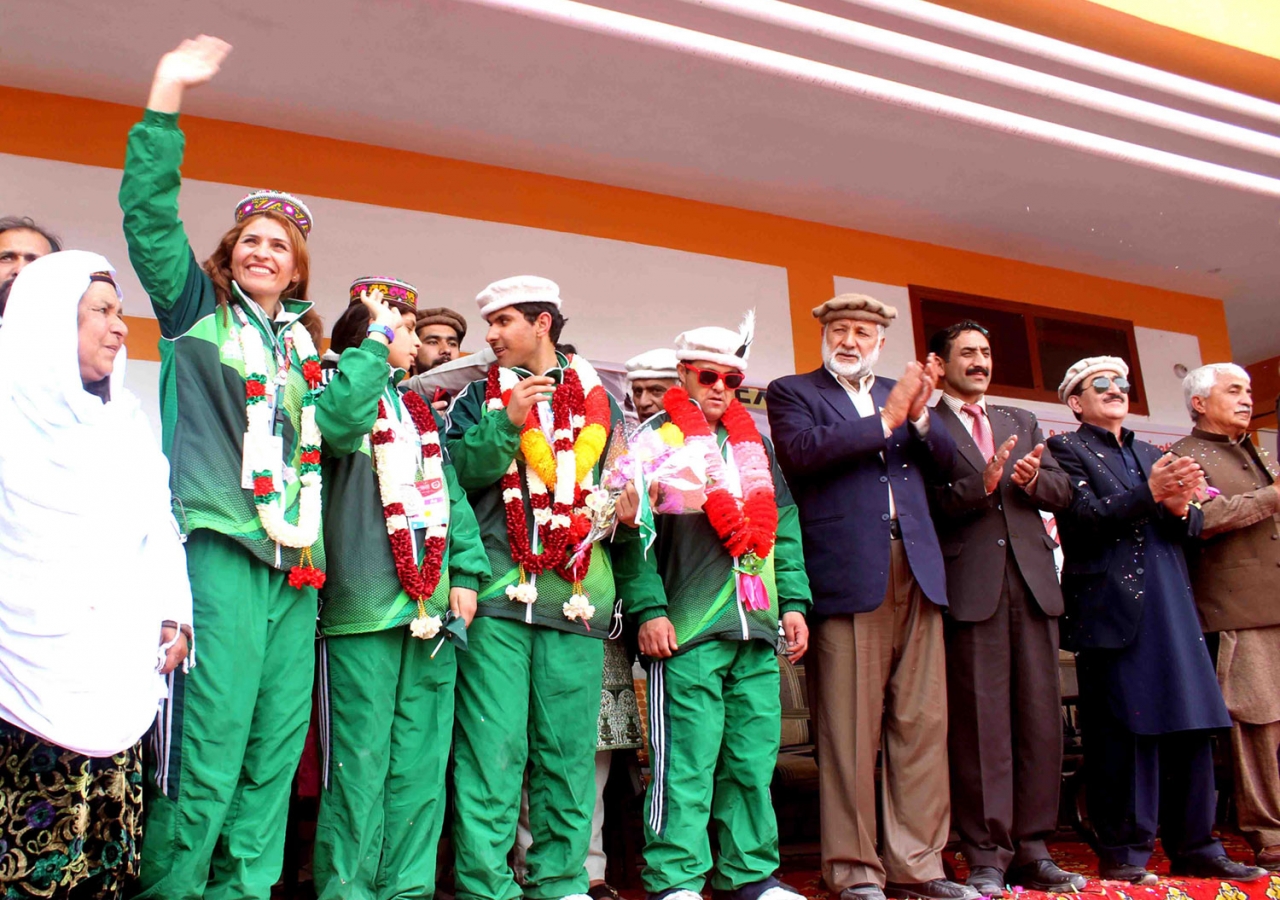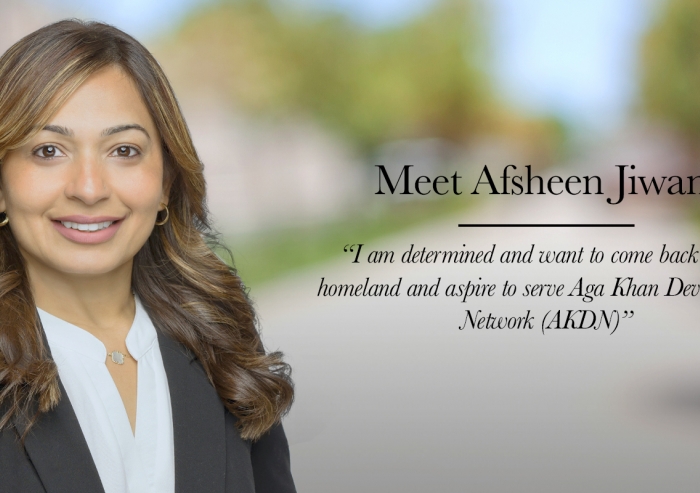Ms. Amina Parveen Barkatullah Baig was one of Pakistan’s coaches for 2017 for Special Olympics. Amina hails from a very remote area of Gilgit-Baltistan. She currently works as a Health & Physical Instructor at the Mehnaz Fatima Inclusive Education & Welfare Institution, Gilgit. She has also been affiliated with the Aga Khan Youth & Sports Board for Gilgit as a volleyball coach since 2012. She is an athlete herself; she was selected for the Volleyball team for the Josh Games held in Malaysia, and after her return took a Master’s Degree in Health & Physical Education from Sarhad University of Science and Technology Peshawar.
Q) Tell us about the team and their background
I was introduced to Special Olympics Pakistan in December 2014 at the time of joining the Menhaz Fatima Montessori & Inclusive Education Institution. The Pakistani Special Olympics committee arranged a sports event in Gilgit, to which my school was also invited. We attended the event after intensive training with my students at the school. After the marvellous games, we returned with medals and were later selected for National Special Olympics Football Championship, Peshawar. Soon after this, in 2015, I received a letter informing me of my selection as a Coach for International Special Olympics 2017. With the support of Special Olympics Pakistan and the Menhaz Fatima School, we arranged several sports camps all over Pakistan and successfully trained many special children and finally made a team of 12 participants, 3 from Gilgit, 3 from Abbottabad, 3 from Lahore, 1 from Murree, 1 from Karachi and 1 from Islamabad, who along with three coaches would appear in the International Special Olympics.
Q) Tell us about their achievements at the Special Olympics?
Achievement is not always material or about the number of medals we get. When we reached the venue of the Games, we learned that this is the same place where Mawlana Hazar Imam has also skied in his initial days of competitive skiing and this in itself was very motivating for all the participants. Initially, these special children were not able to eat by themselves, could not change their clothes independently or carry their own luggage. With continuous training, these children showed a marvellous teamwork and also helped other participants in the game. Due to scarce resources, we could only train these children in Cross Country Skiing and Snow Shoeing, which was also funded by the Pakistan Air Force. In total, Pakistan won 16 medals, which included 5 Gold, 7 Silver and 6 Bronze medals.
Q) What difficulties have the team faced and how have they overcome them?
For these young people, the main aim of the Special Olympics is simply being able to participate. It is not easy to train special persons; they are very sensitive and easily become over-stimulated. One of my players, Parvaiz Ahmed, who has Down’s Syndrome, needed my support before the start of any event. I had to converse with him on the microphone to make sure that he participates well in the game. For ordinary athletes, it is easy to explain what they have to do when the whistle blows or how to wait in the line till for their turn but it is equally difficult for these special athletes to understand this. They cannot wait for long or wait at all in the line and do not always understand properly what they have to do when the umpire blows the whistle. We tried to overcome this issue by extensive training in Pakistan and we observed that Pakistani players understood the Games’ norms much better than many other participants.
One of the main challenges was to convince the parents of these young people to let them participate. Being from far-flung areas, where education levels are low and where prejudice is rife, it was difficult for the parents to accept that their children are capable and will be participating in the International Special Olympics. It was also not easy to persuade the parents to give their children permission to fly abroad without them, especially given the amount of support and care these young people need. It took a number of meetings with them to allay their fears.
Another challenge was that we had no place to practice. We had to request the Aga Khan Higher Secondary School Gilgit to lend us their ground for a couple days and also requested the Ismaili Council for Gilgit to provide security while practising. The spirit of sports was there in the hearts of the entire team and that is how we flourished and were able to secure 16 medals for Pakistan.
Q) Is being from a developing country a disadvantage for our athletes in international competitions? Do foreign competitors have better support systems?
Not at all, there was not a single second we felt or were treated as though we were from a developing country. We were all greeted and given Special Austria 2017 necklaces and gear for our stay. There were 4000 volunteers from Austria present to support us and each country was allotted 4 -5 volunteers. They stayed with us in the same hotel to help us communicate and travelled with us throughout our stay.
Q) How much time did they spend on sports activities?
When I came to know that I am a part of Special Olympics 2017, I knew this was a chance to change my players’ lives. I have trained these athletes for more than a year at different places; at times I used to arrange camps at different villages. These players have given their hundred percent but as they are different from ordinary individuals, each one of them has a separate temperament and energy. Initially, I had to work with them individually but later started training them in a team. As I mentioned, we had scarce resources, we could only practice 2 hours a day for few days.
Q) What was their motivation throughout?
I am the only child from among my other 6 sisters who have continued my education and progressed this far. When my father was dying he took a promise from me that I will do something for these special children. Our Institutions, Government and other Private Institutions have built schools for ordinary children but I don’t see much of the work being done for these special children. In Gilgit too, we have only a few institutions that are working for them. This creates a need for individuals who can step up and work for them. I am always motivated by the thought of doing something which others have not thought of or have worked for and my promise to my father keeps me motivated. My plan is to reach to those areas in Gilgit-Baltistan which are extensively backwards and do not have proper infrastructure to commute and communicate.
Q) How long have you been coaching?
In total, it is now 9 years. I started my sports career with the Gilgit Sports Board and participated in Volleyball Championship for three consecutive years 2008-2010. Then I became a coach with the Aga Khan Youth and Sports Board and gave training for Volleyball and Football. I began training for the Special Olympics after my selection in 2015, which has continued till date, and I am also working full time as a Physical Instructor at the Mehnaz Fatima Inclusive Education & Welfare Institution.
Q) How much time do you spend on their training?
I am a sportsperson at heart and my late father was a boxing champion in his time. My education, my job and my passion can never let me leave sports. Yes, I do practice sports every day. After my working hours, I train other special children in sports. I also take guidance from a physiotherapist working at Menhaz Fatima School, who helps me with some exercises that I can use while teaching sports. My vision is to prepare as many special children to qualify for national and International Special Olympics.
Q) What is your message for other athletes?
Taking this as an opportunity, I would like to say that those athletes who have come this far, they have to come forward and help me train other special children to reach to the same place. This is not the end but the beginning of a new world. All of them have to work really hard and prove that they can manage independently like an ordinary child.
For the other athletes, I would also want to convey that the passion of sports you have will never die. Find the courage, work for it and reach what you are destined for. The world is full of challenges and might pull you down but with strong willpower and hard work, the sky is the limit.








